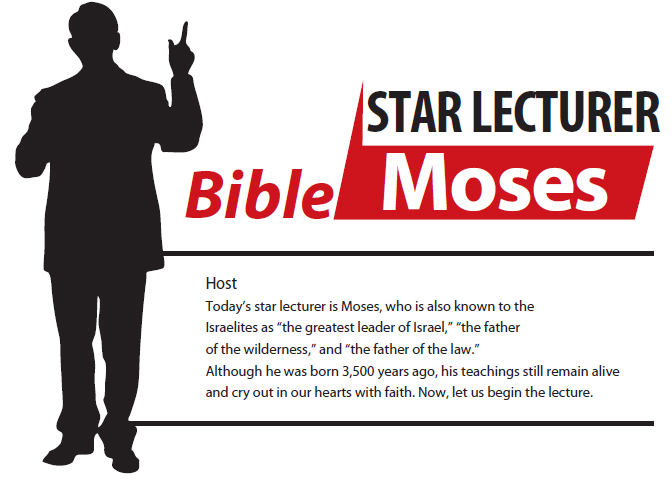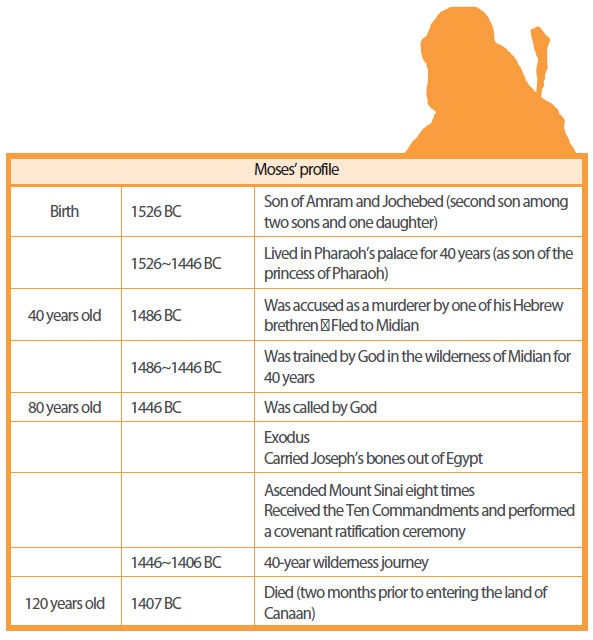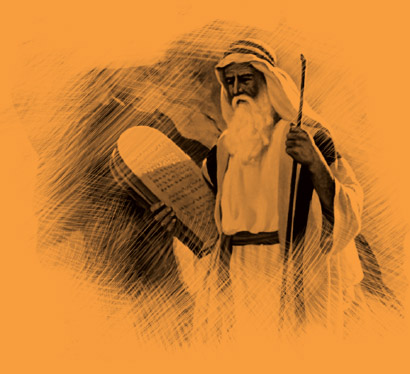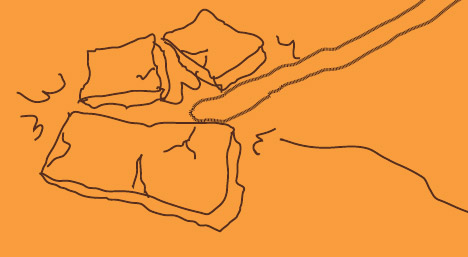|
STAR LECTURER Bible Moses
|
|
|
글쓴이 :
관리자
|
|

Lecture 1: Moses was placed in a wicker basket three months after his birth
The year I was born, which was 1526 BC, was a period of great darkness. Under Thutmose I’s order to annihilate the people of Israel, all male babies born to Hebrews were to be thrown into the Nile River. And thus, as soon as I was born, I also faced the fate of being thrown into the river. When I was born, my parents saw that I was beautiful. “Beautiful” is tob in Hebrew, meaning “beautiful” and “good.” Is it possible to see such beauty from a newborn baby? Of course.
My parents saw me through the eyes of God and discovered the divine administration that was hidden within me. From that moment on, they did not fear even Pharaoh’s decree and kept me concealed for three months.
However, when they could no longer hide me, they set me adrift on the Nile River in a wicker basket, which was coated in tar and pitch to protect it from the water.
They probably borrowed the idea of coating the basket with tar and pitch from Grandfather Noah, who had the special patented technique on the ark construction.
The wicker basket that had protected me through the deadly Nile River was spotted and drawn by the daughter of Pharaoh. And that was how my name became Moses, which means “drawn out of the water.”

Lecture 2: Why Moses took his sandals off and became barefoot
What was my life as an Egyptian prince like during my first 40 years? I grew up in the teachings and prayers of my nanny, Jochebed, who was also my birth mother. Also, I received a thorough education of Egypt’s culture, economy, academics, and military. I thought I was good enough to be a prominent leader of Israel. However, when I was 40, I was accused of murder by one of my own Hebrew brethren, and I immediately had to flee into the wilderness of Midian. As I lived there for 40 years shepherding the flocks, I received rigorous training and experiences by which I could later discipline the Israelites.
When I was 80 years old, I was called by God in Mount Horeb. I witnessed the marvelous sight of a bush burning with fire, yet the bush was not consumed. While I watched, I heard the voice of God: “Remove your sandals from your feet, Moses, for the place on which you are standing is holy ground.” I looked down at the sandals on my feet, but I soon realized that the sandals He was referring to were not the literal ones that we could see.

God’s command was for me to remove the sandals of knowledge, sin, and possession that I had acquired back in Egypt. When I gathered my senses, I realized I was standing on the land that was called by God. It was the land wherein I could not take even a single step to approach God if I did not remove my sinful sandals.
In my time, only free men could wear shoes and slaves could not. When God commands to take off our sandals, it is the moment when we are being called to become the servant of God. We no longer wear the sandals of arrogance that took us wherever we wanted to go, but instead go barefoot, knowing that God takes full responsibility for us. For this reason God promised in Deuteronomy 11:24, “Every place on which the sole of your foot treads shall be yours. . .”
Lecture 3: The account on the center of the world: Moses’ ascents to Mount Sinai for 127 days
Forty-five days after the Exodus, on the first day of the third month in 1446 BC, the Israelites and I arrived at Mount Sinai. The next day, on the second day of the third month, I made the first ascent to Mount Sinai. While Korea’s Mount Halla is 1,950 meters and Mount Jiri is 1,915 meters in height, Mount Sinai is as high as 2,291 meters.
Moreover, Mount Sinai is a rough place. It is surrounded by large boulders, it is full of thorn bushes, and it was a dry and parched land without any moisture. As I climbed towards the top of the mountain, I realized that my heart was just like the mountain: hard like the rocks, useless like the thorn bushes, and completely dry and withered.
It was there that God proposed to make the Sinaitic Covenant with the people of Israel. I delivered the message to the Israelites once I came down from the mountain. All of them obeyed and said “Amen.” Throughout the 127 days, which still remain vividly in my memory, I climbed up and down Mount Sinai for a total of eight times from the first day of the third month to the tenth day of the seventh month.
I obeyed God’s Word and set bounds around the huge mountain in order to keep the people from breaking through. I read from the Book of the Covenant and sprinkled the blood of the covenant on the people who answered “Amen” during the covenantal ceremony. After this, Nadab, Abihu, Aaron, and seventy of the elders of Israel partook in a divine feast, joyously eating and drinking before God on Mount Sinai.
However, that moment of joy and glory did not last long. As I came down from the mountain with the stone tablets God had made for us, I witnessed the Israelites worshiping a golden calf and dancing around it.
They were the ones who said they would do everything according to God’s command. How could their hearts change so quickly like that? Among them were the leaders who had seen God in person only 40 days ago. I was devastated. The tablets God had made for us were shattered.
When God said that He would destroy the Israelites, I put my own life on the line and underwent a 40-day intercessory prayer. I did not stop praying until I received an answer from God. I writhed on the ground, pounded on my chest, and tore at my garments during these 40 days.
God’s fierce wrath finally subsided. He ordered me to cut out two tablets of stone and come up to the mountain. Then He inscribed the Ten Commandments on the tablets.
The center of the world is Israel, and the center of Israel is Jerusalem. The center of Jerusalem is the Holy of Holies, and the center of the Holy of Holies is the ark. And the center of the ark is the Ten Commandments. The Ten Commandments became the foundation on which all detailed clauses of the Law were established. It was the beginning of Israel’s official emergence as the chosen people.

Lecture 4: Moses could not enter the land of Canaan because he was not able to solve the code of “Tsur” and “Sela.”
In Kadesh, where there was no water, the people quarreled and grumbled against me. Although I had always been humble during the 80 years of preparation and the 40 years of the wilderness journey, at that instant, I was provoked to wrath by the people’s harsh complaints.
Instead of facing the rock and commanding it to bring forth water as God had told me, I committed a serious sin and struck the rock twice. Because of this incident, I was forbidden from entering the land of Canaan.
I was just now able to solve the code of the rock after reading from page 318 of The Forgotten Encounters, the second book of the History of Redemption series.
The rock of Mount Horeb in Exodus 17:6 and the rock of Kadesh in Numbers 20:8 were different in their shapes and appearances. The original Hebrew language explains their differences clearly.
The rock of Mount Horeb is “Tsur” in Hebrew, meaning a gigantic boulder.
However, the rock that I was to command so that it would bring forth water at Kadesh is “Sela” in Hebrew and was a fissured rock. Later, Apostle Paul in 1 Corinthians 10:4 said the rock that brought forth water in the wilderness foreshadowed Jesus Christ.
The striking of the rock at Mount Horeb foreshadows the work of the Cross, on which Jesus, the source of life, would be afflicted and killed to provide eternal living waters for all mankind.
However, as the rock “Sela” in Numbers 20:8 was already split, there was no need to strike it again; it only needed to be spoken to. If I had realized God’s hidden administration of redemptive history in the rocks of “Sela” and “Tsur” by reading the History of Redemption series on which you all are avidly reading, what might have changed? I sometimes think about this.
Every book of the Bible is filled with the divine administration in the history of redemption to testify of one man ? Jesus Christ. Lastly, I sincerely ask you not to make such an irreversible mistake as I made. I presented this final request in three parts in my farewell sermon in the Plains of Moab on the first day of the eleventh month, 40 years after the Exodus.
“Remember the days of old,” “Consider the years of all generations,” and “Ask your father and your elders.” These three commands are the most concrete codes of conduct that you should follow as you journey towards the spiritual Canaan, the kingdom of heaven.
Written by reporter Ji Kun-Wook
(This article is a summary of the excerpts from the book “The Covenant of the Torch,” the second book of the History of Redemption Series (Abraham Park, Periplus), and the lecture “The account of Moses’ eight ascents to Mount Sinai” during the 2012 Summer Conference on Aug 1-2, 2012).
|
|

